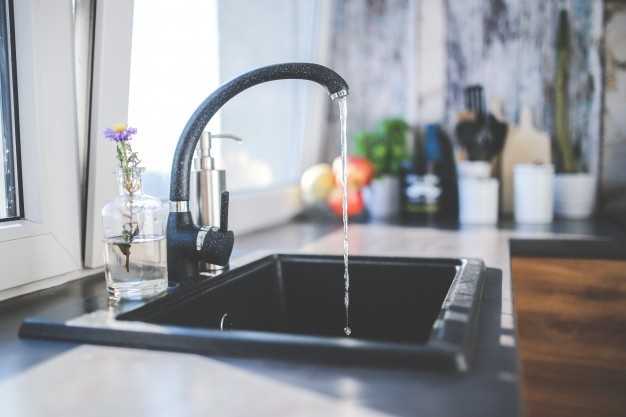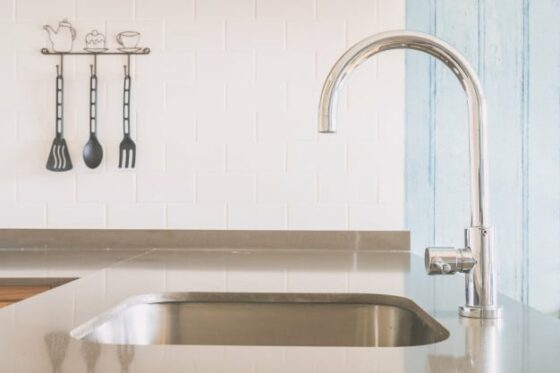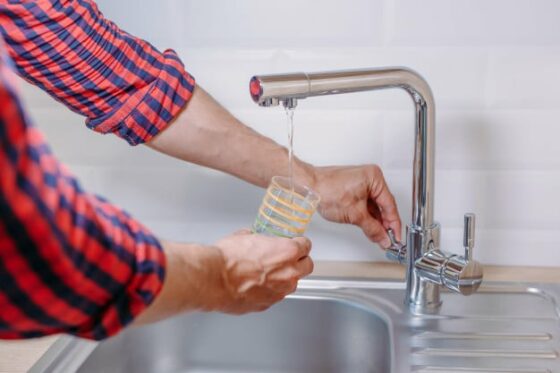Clean water may sound simple, but its importance is beyond what we can imagine. Clean water is hygienic. If you drink from your tap supply, one way to ensure clean drinking water for you and your family is by using water filters or purifiers.
Table Of Contents
−- Best faucet water filters
- What are Faucet Water Filters
- Installing Faucet Water Filters
- What do Faucet Water Filters Remove?
- Cost of Faucet Water Filters
- Home water usage
- Water filtration capacity
- Water filtration quality
- How do faucet water filters work?
- Why do you need a faucet water filter?
- Water filter types
- How to clean and replace a faucet water filter
- Buyer’s guide
- FAQs
- Last words
Faucet water filters can improve drinking water quality by removing unpleasant odors and tastes. Although often overlooked in favor of the higher-end sink and whole house water filters, faucet water filters are a great choice for some households.

Let’s learn more about this product, and hang on for our recommendations!
Best faucet water filters
PUR PFM400H Faucet Water Filtration System
The NSF-certified PUR Advanced Faucet Filtration System removes up to 99 percent of lead and other pollutants 0.3 microns or larger.
The activated carbon filter has a capacity of 100 gallons, so it should last for around 2-3 months before needing to be replaced.
The filter connects straight to most kitchen faucets, although an adaptor may be required in other circumstances. Aside from frequent filter changes, the system rests horizontally and requires almost no maintenance.
Pros
- Reduces more than 70 pollutants
- Lower pricing point than competitors
Cons
- Lower water pressure may impair performance.
- There could be problems with the filter change indicator light.
PUR FM-3700 Advanced Faucet Water Filter
This faucet water filter from PUR is undoubtedly the best we have tried. PUR has been making great water filtration systems for 30 years, so the years of experience speak for themselves. It can remove 99% of lead and up to more than 70 contaminants typically found in water. So with this, rest assured that you’ll have odorless and tasteless water.
This unit’s one-click tool can easily switch between filtered and unfiltered water. It is easy to install as it requires no additional tools. TheIn addition, the manufacturer offers a generous 2-year warranty for your peace of mind.
The filtration capacity of this filter is 100 gallons which may last up to 2-3 months before replacement. But, when we tried it, 100-gallon filters only lasted us a month, but of course, that’s largely dependent on your household’s usage.
Pros
- PUR advanced faucet water filtration system
- Removes 99% lead + over 70 contaminants
- No need for additional tools
- One-click tool-free attachment
- Compatible with most faucet types
- 2-year warranty
Cons
- Pricey
- 100-gallon filter capacity should be improved
Culligan FM-25 Faucet Mount Filter with Advanced Water Filtration
Culligan’s FM-25 is a large faucet filter that boasts a 200-gallon capacity. What’s even better? It’s twice the capacity of our previous filter, but it is not double the price! In addition, it is NSF/ANSI Standards 42- and 53-certified with the effective capability to eradicate lead, chlorine, bad taste and odor, and other harmful contaminants.
This filter utilizes 0.5 GPM (gallons per minute) flow and 60 psi (pounds per square inch) of pressure. In short, this is a strong one! In addition, the company claims that this is easy to install with no additional tools. While this is true, we see that customers complain about replacing the faucet filters.
Like the previous filter, this also switches between filtered and unfiltered water. Plus, it comes with a 2-year warranty as well.
Pros
- 200-gallon capacity
- Effectively removes contaminants
- NSF/ANSI-certified
- Diverter tab to switch from filtered to unfiltered
- Cost-effective
- 2-year warranty
- Easy installment plans
- Compatible with most faucets
Cons
- Quality can be improved
- Customer complaints regarding faucet filter replacement
Engdenton Faucet Water Filter
This filter from Engdenton has an impressive high-quality food grade 304 stainless steel housing, making it highly durable. In addition, it is leak-proof and crack-proof. On top of its top-notch exterior, it also boasts a whopping 320-gallon filter! The highest on our list. At the very least, it should take you 3 months before a replacement is needed. In addition, it has a 0.5 GPM and is easy to install.
To top off, the device can be rotated up to 360 degrees. This way, you can now easily wash your hands and elbows comfortably without being in awkward positions. Its Activated Carbon Fiber (ACF) technology can eliminate lead, chlorine, rust, sand, and bacteria.
However, you have to remember that this is not compatible with some faucets, which is a downside if yours won’t work with this filter/
Pros
- Durable stainless steel build
- Filters harmful contaminants
- Easy to install with no additional tools needed
- Rotatable 360 degrees
Cons
- Expensive
- Limited compatibility
- No warranty
Kabter Faucet Mount Water Filter System Tap Water Filtration Purifier
This faucet water filter from Kabter is durable and easy to use. All it takes is a quick switch for you to have mercury-, lead-, cyst-, and chlorine-free water. This is conveniently compatible with most faucets in the market, with 200 gallons of filter capacity.
While it does not have the most premium features nor a warranty deal to boast about, its low price makes up for those. It does what a filter should do without breaking the bank.
Pros
- Made of durable ABS plastic
- Filters harmful contaminants
- 200-gallon filter capacity
- Cost-effective
- Compatible with most faucets
Cons
- There are other higher-quality filters
- No warranty
What are Faucet Water Filters
Faucet water filters are attached to the water faucet in place of the aerator. They consist of a cylinder containing the filter and a knob that turns the filter on and off. Some faucet water filters do not have a knob; rather, the cartridge tank moves up and down to the filter on and off.
The purpose of turning off faucet water filters is to use filtered water for drinking, but non-filtered water is used for other tasks, such as washing dishes. This conserves the cartridge, thus making them last longer.
Installing Faucet Water Filters
Installing faucet water filters is extremely easy, and most homeowners will have no problem doing it themselves. First, place one hand under the faucet and turn counterclockwise to remove the aerator. Next, screw in the metal coupling provided with the faucet water filter and then attach the water filter itself by screwing it in.
Install the cartridge inside the cartridge tank and turn the water on. Allow the water to run for several minutes to flush excess carbon out before using.
What do Faucet Water Filters Remove?
Faucet water filters remove several undesirable elements from drinking water. They remove trace amounts of artificial and natural chemicals such as radon, pesticides, and chlorine. If the cartridge is an activated carbon filter, as most are, it removes any odors or tastes, such as sulfur, in coastal locations.
Cost of Faucet Water Filters
Faucet water filters are the most inexpensive water filter available other than a pitcher filter. Prices vary by manufacturer, but faucet water filters generally run between $20 and $60. In addition, they require a filter cartridge that must be replaced every month, sometimes more depending on water usage. The average cost of a replacement filter cartridge is $20 to $35.
Home water usage
Since water is filtered on demand, a separate container should be used to collect filtered water. There are three usual usage profiles. Let’s discuss them briefly.
Low usage
This type is best for homes with two people, especially if the water demand for cooking is also low.
Medium usage
A medium usage profile is ideal for a household of four, each consuming an average amount of water daily. This is truer too if the household members prepare food using filtered water.
High usage
Once a household has four or more members who take up lots of filtered water in their daily activities, a high usage profile is recommended. These households may also opt to utilize a different form of filters, like under-sink water filters.
Water filtration capacity
Each filter has a different water capacity before replacement is needed. Typically, this is expressed in months and gallons. For example, the smallest faucet filter has a capacity of 40 gallons, while larger ones can filter up to 120. Thus, filters can last from as quickly as 2 months to 6 months.
Water filtration quality
To know the efficacy of water filtration, you might want to check a filter’s certification. The two most common certifications are:
- NSF/ANSI 42: effective removal of iron, chlorine, magnesium, sulfides, hydrogen, and other similar substances
- NSF/ANSI 53: effective removal of asbestos, arsenic, lead, copper, mercury, organic and inorganic compounds, and bacteria
NSF 53 remains the highest standard as it can eliminate more contaminants than the others. This is highly recommended if your area has a poor water supply. But, if you just need to have better-tasting water with no odors, NSF 42 will work just fine.
How do faucet water filters work?

Faucet water filters have two layers:
First layer
The first layer is a protective screen that covers the main filter. This is the layer water comes in contact with first; through this layer, sediments or large contaminants get filtered.
Second layer
The second layer is typically made of activated carbon, an effective disinfectant. In addition, it boasts 32,000 square feet of surface area to trap the smaller contaminants and other metals such as magnesium and calcium.
Why do you need a faucet water filter?

Destruction of bacterial growth
Tap water isn’t bacteria-free. While we cannot eliminate bacteria 100%, using faucet water filters still do enough to eliminate them significantly. But still, the more contaminants are eradicated, the cleaner and safer the water is!
Elimination of chlorine
Another harmful contaminant is chlorine. It may be a great disinfectant, but it is not good for human bodies. In excess, it may cause vomiting, coma, and even death. Yikes! Although tap water does not need as much cleaning as swimming pools do, it still contains chlorine, so it’s safe to have that filtered out before consuming it.
Elimination of lead
This may surprise you, but we do not want 100% pure water. Why? Because this means we’re missing the essential minerals it typically houses, such as calcium, iron, zinc, and potassium.
But when it comes to lead, that’s a different story. Lead can increase blood pressure and induce kidney damage! In addition, it is a toxic element, so you’d want a filter that effectively eradicates this. Thankfully, most faucet water filters do!
Elimination of other sediments
Sediments are residual dirt, sand, or metal in water. Although the amount may not be significant, you would still be surprised at how much sediments you can filter out of water. Therefore, we are better off without consuming these; most water filters can help eliminate them.
Fresh and odorless water
Some contaminants can make your water have some weird taste and smell. This may throw you off and prevent you from drinking water. Faucet water filters can solve this problem so you can have tastier water you’d look forward to drinking!
Economical
Although you’ll need to replace your filters once every few months, faucet water filters are generally cheap. Especially as compared to purchasing bottled water all year round! In fact, research revealed that 90% of the cost of bottled water goes to marketing and manufacturing, while only the remaining 10% is allocated to water itself. Do the math!
Eco-friendly

Plastic harms the environment, and opting for faucet filters rather than bottled water does our environment a lot of good!
Cheaper than large filtration systems
Because it’s cheap, it does not mean that the filtration system of faucet water filters is inferior. Plus, it does not take up a lot of space and typically has a switch that allows you to toggle between filtered and unfiltered water. Plus, they are pretty easy to install!
Water filter types
- Direct flow-thru faucet filter
This type is directly attached to the end of the faucet, so it saves space. However, because of its small size, it should be replaced faster.
- Side offset flow-thru faucet filter
The more famous one is the side offset filter placed on the sink’s side. Thus, it has a larger capacity, so you won’t have to replace it as much as you would in the previous type. However, this is more expensive.
How to clean and replace a faucet water filter
Here are the steps to effectively clean and replace your faucet filter. Remember, maintenance is key to keeping your filter working well for a long time!
- Turn the water supply off.
- Remove the aerator located at the end of the faucet with a wrench. Wrap a cloth around the faucet to avoid unnecessary jerking. Skip this step if you don’t have an aerator.
- Clean the threaded aerator you just opened and apply a few wraps of Teflon tape to ensure that the threads attach after the clean-up.
- If the aerator is damaged, you might need an adapter. If not, skip this step.
- Install the faucet attachment piece. Refer to the diagram.
- Attach the cartridge and other parts.
- Flush the leftover water out by letting it run for 5-10 minutes.
- Check if the cartridge is properly installed.
Buyer’s guide
Filter capacity
The larger the filter capacity, the longer it will take before you need a replacement, and the lower the overall cost to operate it. As a good estimate, a 100-gallon water filter capacity can last up to a month. But keep in mind that the bigger the capacity, the bigger the unit cost.
Efficacy
Faucet filters can eliminate contaminants in varying degrees. In this light, it takes quick research to know which ones are better than the others. If you don’t want to look any further, check our recommendations above as they have great efficacies.
Compatibility
Not all filters are compatible with most faucets. The only workaround here is ensuring that the filter you’re buying is compatible with your faucet.
Durability
The more durable a filter is, the longer you can enjoy it. The most durable materials are stainless steel and ABS plastic, so you might want to check filters built with those.
Warranty
The longevity of the warranty almost always reflects the manufacturer’s confidence in its product. Therefore, the longer it is, the better for you!
Swivel capacity
Although this is not 100% necessary, a faucet filter that swivels 360 degrees is an extremely useful and convenient future so you won’t have to strain your back when washing your hands or elbows.
Faucet filter change sensor
Some faucet filters boast an advanced filter change sensor feature. This is an indicator that lets you know when you already need to replace the filter. There are two types:
- Light sensors: This LED light sensor starts out green and slowly turns red once a replacement is imminent.
- Day counting sensors: this keeps track and displays the number of days that have passed since the last time you replaced your filter.
FAQs
Are faucet filters better than water pitchers?
Should I buy a large faucet water filter?
Do I need any installation tools during installation and replacement?
Which is better: direct or side offset flow-thru water filter?
Direct flow-thru faucet water filter
- Pros: more affordable and saves space
- Con: smaller cartridge
Side offset flow-thru faucet water filter
- Pro: larger cartridge
- Cons: pricer and imposes a heavy load on the side of the sink, which can induce premature wear and tear
Last words
And there you have it! First, we have discussed the information you need to know before purchasing your faucet water filter. Next, refer to our buyer’s guide and recommendations to hopefully help you decide.
Faucet water filters have several advantages over other water filters, including their low cost, ease of installation, and portability. They are also often used in conjunction with water softening systems to improve drinking water quality further.
Our easy favorite is the PUR FM-3700 Advanced Faucet Water Filter! Happy shopping!

Jay
Jay is a health and wellness enthusiast with expertise in water quality and nutrition. As a knowledgeable advocate for holistic well-being, Jay successfully manages Type 2 Diabetes through informed lifestyle choices. Committed to sharing reliable and authoritative insights, Jay combines firsthand experience with a passion for enhancing health."





